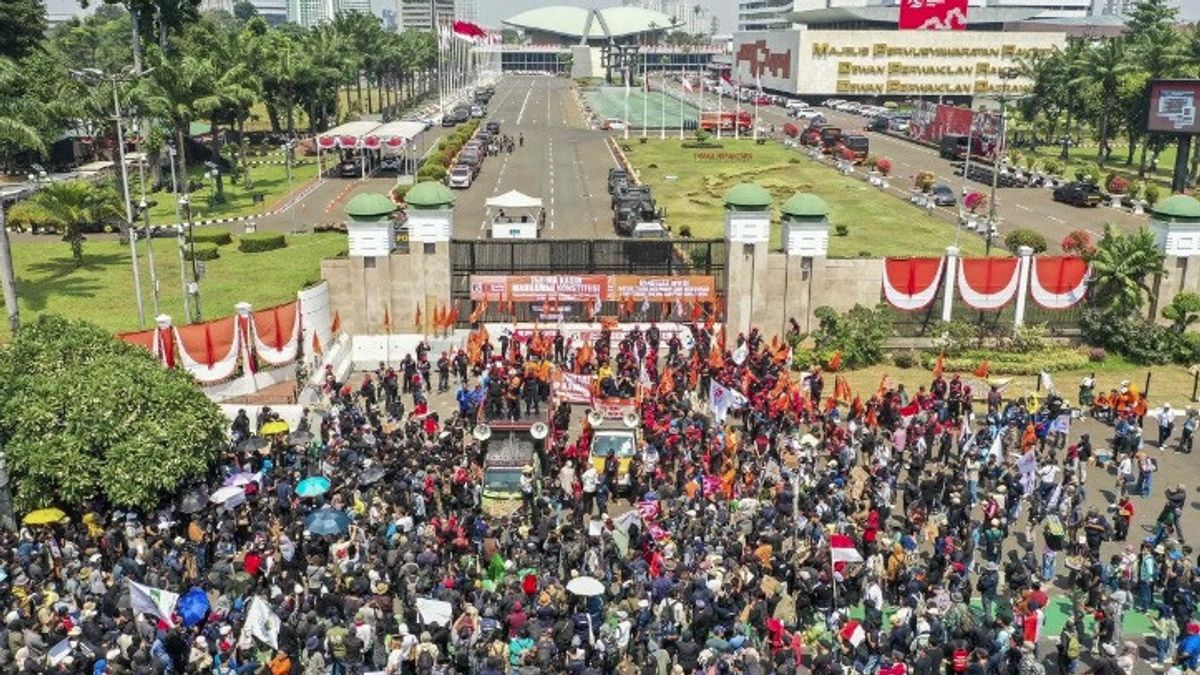JAKARTA – What has happened in Indonesia lately has more or less affected the mentality of the people. In psychology, this is called systemic trauma.
Throughout last week, the Indonesian people were presented with political dynamics that, for most people, were tiring. Ironically, this series of events occurred not long after Indonesia celebrated its 79th anniversary of independence.
This incident began when the Constitutional Court (MK) issued a decision to grant the petition of the Labor Party and the Gelora Party in part related to the threshold for regional head nominations in Decision Number 60/PUU-XXII/2024 on August 20, 2024.
In addition, the Constitutional Court also decided on the rule that the age limit for gubernatorial and deputy gubernatorial candidates is 30 years old, effective from the time the candidate is determined.

However, the two decisions were tried to be blocked by the Legislative Body (DPR). Within 24 hours, the DPR refused to accommodate the Constitutional Court's decision and proposed the ratification of the Pilkada Bill.
The people were angry with the DPR's decision, and the peak was holding a demonstration on the same day the DPR would ratify the Pilkada Bill, Thursday (22/8/2024). Almost all elements of society took to the streets to oppose the DPR's plan to ratify the Pilkada Bill, one of which was actor Reza Rahardian. He even had time to give a speech in the midst of the demonstrators.
"I am not involved in any practical politics. I am present here as an ordinary person, with all my friends, not representing anyone, other than the voices of the people who are restless today," said Reza Rahadian.
Psychological Pressure
What Reza Rahadian said is true. Many Indonesian people feel restless and anxious seeing the political situation in the country. President Joko Widodo's (Jokowi) leadership has received a lot of criticism as his term of office ends.
Jokowi is suspected of 'meddling' to smooth the way for his eldest son, Gibran Rakabuming Raka, to run as vice president in the 2024 presidential election, which he later won.
Now that the DPR is trying to annul two points of the Constitutional Court's decision which are said to be a breath of fresh air for Indonesian democracy, the restless Indonesian people are no longer remaining silent. The series of unpleasant events recently, in psychology, can cause systemic trauma.
According to psychologist Audrey Susanto, systemic trauma occurs when a large group of people experience psychological pressure due to a system or social structure that is pressing or oppressive.

"This includes ongoing political violence," Audrey said, quoted from her personal Instagram.
Audrey continued, situations full of continuous violence are categorized as continuous traumatic situations or CTS. CTS is a condition in which individuals or communities are continuously exposed to violence and/or uncertainty.
Meanwhile, the American Psychological Association (APA) describes CTS as a type of continuous trauma exposure related to living in an area that is experiencing political violence and national security threats.
Continuous traumatic stress also describes the psychological impact of living in conditions where there is a real threat of current and future danger, not just the experience of traumatic events in the past.
Future Concerns
The relationship between a country's political situation and the mental health of its citizens has actually been a global discussion.
According to health data published by mentalhealth.org.uk, uncertainty in the political world can affect mental health. And this is not only experienced by politicians, but also ordinary people. Research conducted by the American Psychological Association in 2016 revealed that 66 percent of people experience stress due to the political climate in their country.
The concept of CTS itself was originally developed in the 1980s by a group of mental health professionals working in South Africa (South Africa) during the apartheid era. At that time they were trying to provide psychological support to victims of political violence in the context of ongoing state oppression.
Back to the current political situation in Indonesia, which according to some people is not doing well. Most people are worried about how to face the future if this political situation that is not in favor of the people continues.
Audrey said that continuous exposure to CTS is indeed very likely to increase the risk of trauma such as anxiety, feeling unsafe, and difficulties in daily life.
"Systemic trauma not only affects us now, but also has an impact on the next generation. Children who grow up in a violent environment often experience emotional development disorders," she concluded.
The English, Chinese, Japanese, Arabic, and French versions are automatically generated by the AI. So there may still be inaccuracies in translating, please always see Indonesian as our main language. (system supported by DigitalSiber.id)











